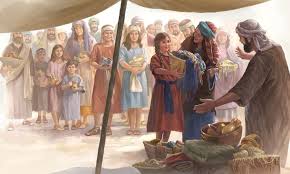The Offerings of Materials for the Tabernacle

The matter of the Tabernacle spans 13 of the next 16 remaining Chapters of Exodus. The ultimate goal toward which God was leading His redeemed people is possession of the Promised Land. On the way toward that end, we have the more immediate goal of the giving of the Torah and the building of the Tabernacle and the religious system it represents, both of which will be of central importance once the Land is conquered. But the building of the Tabernacle was more than simply a matter of building a worship site in the dry desert. It was the House of the divine family where ADONAI was the Husband and His people, Isra’el, was His bride. It was a piece of heaven on earth.485
As we look at this account, we can learn a great lesson on the nature of giving in God’s holy community. Resources were needed to secure the materials and the only source to obtain them was the children of Isra’el. Therefore, Moshe made a plea for the people to give voluntarily give what they could-money. Only voluntary gifts were acceptable as materials for God’s house since love, rather than compulsion, is the basis of all truly biblical giving (Second Corinthians 9:7). Men and women alike (35:22) participated in the offerings for the Tabernacle, as well as, in its construction (35L25-26, 29). The finest materials were brought, and the most highly skilled people were chosen to perform the most intricate of tasks. God’s house deserved His people’s best efforts.486
How and where the Hebrews obtained these materials is easy to understand. Many of these things, such as the fine linen, were given to them by the Egyptians just prior to their departure (3:22, 11:2 and 12:35-36). They also left Egypt with large flocks of sheep and goats.487 Additional material was probably acquired when they defeated the Amalekites at Rephidim (17:8-16). In addition, whatever materials were needed could have been acquired by trade with caravans that passed through the Sinai Peninsula.488
But before the materials for the Tabernacle could be gathered, a general call needed to be made to the people (25:1-2, 8-9 and 35:4, 20-21), and the atonement money needed to be paid (30:11-16).



Leave A Comment